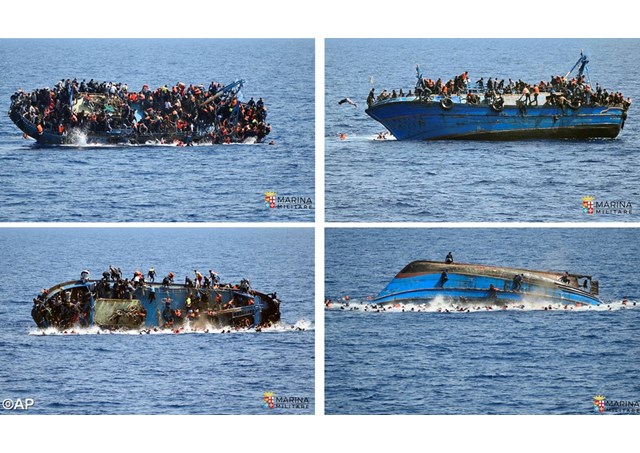
JRS calls migrant shipwreck disaster "a human tragedy"

(Vatican Radio) At least 700 forced migrants may have died at sea this past week in the crossing from Libya to Italy.
About 14,000 have been rescued since last Monday, and there have been at least three confirmed instances of boats sinking. But the number of dead can only be estimated based on survivor testimony, which is still being collected.
Migrants interviewed over the weekend in the Sicilian port of Pozzallo told of a large fishing boat that overturned and sank on Thursday with many women and children on board.
The forced migrants - fleeing wars, persecution and poverty - often do not know how to swim and do not have life jackets. They pay hundreds or thousands of dollars to make the crossing from Libya to Italy which is proving to be the most dangerous border passage for migrants in the world.
Jesuit Father Tom Smolich, Director of Jesuit Refugee Service International, told Vatican Radio’s Linda Bordoni that the fact that people are drowning at sea as they attempt to seek shelter and protection in Europe is a scandal and it is immoral.
Fr Smolich says at this moment “the fundamental thing to say is that this is a human tragedy”.
And borrowing from someone else’s words: “enough poetry, it’s time to do the plumbing”.
Smolich says “these are issues we can all do better on”, issues that Europe can do better on.
“To keep letting people drown in the Mediterranean Sea is a scandal and it is immoral” he says.
Regarding the possibility of opening legal pathways for people to be able to make their crossings in safety Smolich says first of all it is necessary to take into account that this phenomenon is going to keep on happening.
“Europe, he points out, is certainly able - it’s just a question of willingness to provide pathways for folks to enter Europe without risking their lives”.
As far as preventing further tragedy at sea Smolich says he does not have the answer, but attitudes must change:
“The status quo is not going to do it; destroying boats in Libya is not going to do it. Making passages safe and humane, working with people before they come to Europe, dealing with the phenomenon of refugees and migrants in a systemic and fundamentally humane way is the only way to do it” he says.
When asked why some EU member states don’t even want to participate in a plan to distribute so,e 160.000 refugees among other member states, Smolich says “there is a lot of fear out there.”
He says that most often that fear is generated by those who have something to gain from the fear: “ but fear is never a good place from which to make a decision. Fear does not come from God, fear is an evil spirit.
Smolich concludes with an appeal: “can we first remember we are brothers and sisters and figure out what to do from there”.
| All the contents on this site are copyrighted ©. |


